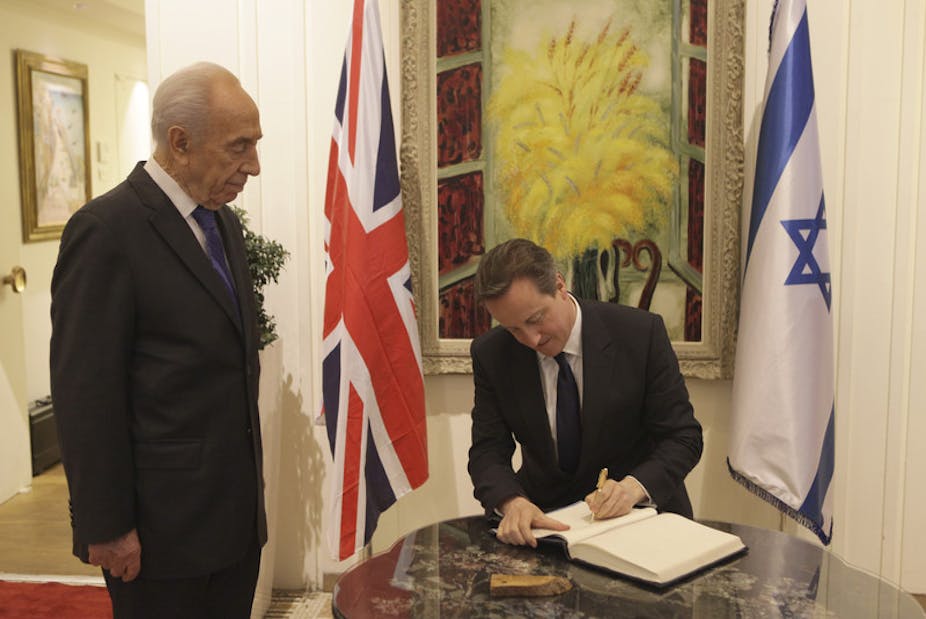Addressing the Israeli Knesset recently, David Cameron proclaimed himself “a British prime minister whose belief in Israel is unbreakable, and whose commitment to Israel’s security will always be rock solid”. He was at pains to refer to the 1917 Balfour Declaration, and to “the proud and vital role” that Britain had played in “helping to secure Israel as a homeland for the Jewish people.”
Six decades earlier, in May 1953, Winston Churchill wrote: “Ever since the Balfour Declaration, I have been a faithful supporter of the Zionist cause.”
He expressed the hope that “the great Zionist conception of a home for this historic people, where they live on the land of their ancestors, may eventually receive its full fruition”. But Conservative Party attitudes towards Israel in the 61 years between Churchill and Cameron were by no means as untroubled as their apparent unanimity implies.
In the inter-war years, Churchill and his small group of Conservative Zionists (including Victor Cazalet, Leo Amery and Robert Boothby) represented anything but the mainstream party opinion. In 1920, Colonel Claude Lowther, MP for Lonsdale and a leading member of the Anti-Socialist Union, gave voice to a view common on the right of the party when he rose in the House of Commons to enquire, in a tone tinged with anti-Semitic disdain, “Since when has Palestine become a new home for the Jews, and is not this a great blow to Brighton?” Some 20 years later, as party leader and prime minister, Churchill would still struggle to impose his views upon a party that remained disconnected at best from the Zionist cause.
From Eden to Thatcher
Anthony Eden, even more than Churchill, is a fascinating figure in the history of the post-war Conservative Party’s relations with Israel. His transformation from archetypal foreign office “Arabist” to the first patron of the Conservative Friends of Israel group was no doubt influenced by his clash with Nasser and Arab radicalism. As prime minister, however, and despite the underhand Anglo-Israeli alliance at Suez in 1956, he did little to foster Anglo-Israeli relations. Harold Macmillan made some progress in that direction, but one senior diplomat’s assessment that his strategy meant “sucking up to the Israelis now when we need them and dropping them as soon as the need is over” is not inaccurate.
That tendency re-emerged in the diplomacy of Edward Heath and Alec Douglas-Home in the 1970s. Douglas-Home’s 1970 “Harrogate speech” was a significant policy statement in its own right, not least for its statement that Britain could no longer “ignore the political aspirations of the Palestinian Arabs”. While Heath’s refusal to deliver arms to Israel during the 1973 war was clearly motivated by the fear of an Arab oil embargo, it was also indicative of a British policy that was decidedly unwelcome among Israeli diplomats, who fretted about Britain associating itself with the EEC’s pro-Palestine statements.
Such issues continued to complicate Anglo-Israeli relations under Margaret Thatcher. The prominence of pro-Arab diplomats like Carrington and Gilmour raised Israeli hackles during Thatcher’s first term. So did the EEC’s 1980 Venice Declaration, which sought to involve the PLO in peace negotiations and denounced Israeli settlements as an “obstacle to peace” and “illegal under international law”. Thatcher also struggled to empathise with Israeli leaders such as Menachem Begin, whose intransigence and insistence she dismissed as “illogical”.
Nevertheless, Thatcher was clearly the chief architect of the party’s friendship with Israel. Her sympathies developed partly as a result of her admiration for what she perceived to be “Jewish” values that placed an emphasis on self-help and personal responsibility, and partly as a political reaction against the Labour left’s strident anti-Zionism in the 1970s. Her support for Israel was couched in a Cold War calculation that if the Western position in the Gulf deteriorated, Israeli would be the only state in the region which would fight the extension of Communist influence.
Thatcher was too shrewd a protector of British interests to sacrifice business in the Gulf on the altar of Israeli-Palestinian politics. And if her pro-Israel instincts did not always prevail over the Foreign Office, her approach to Israel laid the foundations for the improved Anglo-Israeli relations of the 1990s and 2000s. It was those foundations, and the political and commercial interests built upon them, that David Cameron was able to draw upon in Jerusalem last week.

